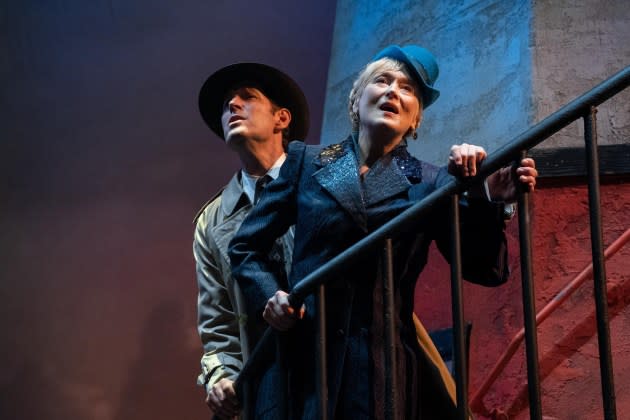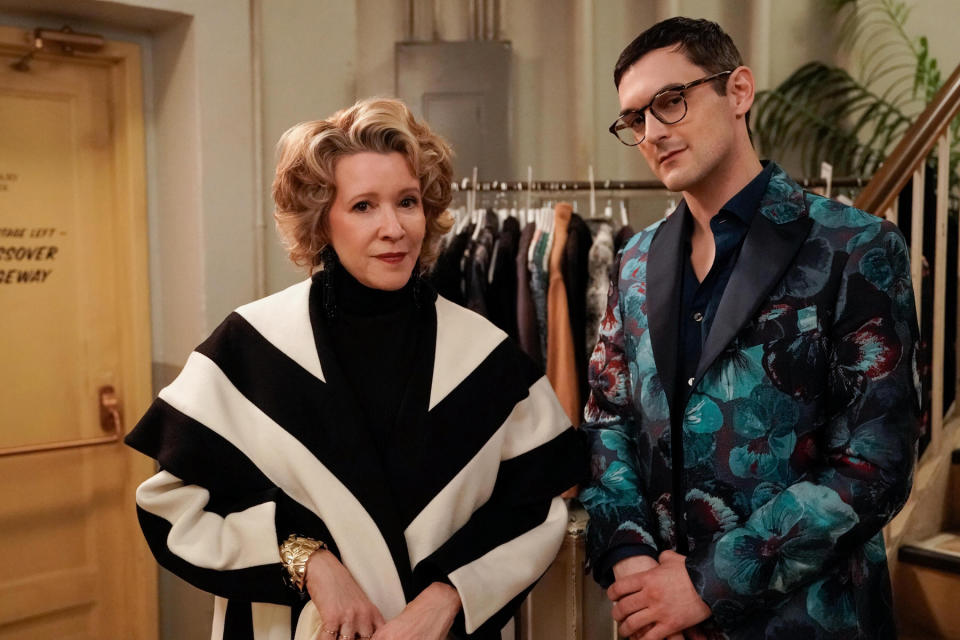‘Only Murders in the Building’ Season 3 Finale Doesn’t Do Paul Rudd Justice
- Oops!Something went wrong.Please try again later.

This post contains spoilers for the season finale of Only Murders in the Building, which is now streaming on Hulu.
The climax of Only Murders in the Building Season Three solves two mysteries for the price of one. It’s opening night for Death Rattle Dazzle, and director Oliver (Martin Short) has stepped into the main role after anxious leading man Jonathan (Jason Veasey) — who himself replaced the murdered Ben Glenroy (Paul Rudd) — got too high to go on. As Oliver’s detective character wrestles with the governess played by his new girlfriend Loretta (Meryl Streep), we discover that the murder was not, in fact, committed by any of the infant Pickwick triplets, but the detective himself. As this revelation is playing out onstage, we see Mabel (Selena Gomez) solving the murder of Ben Glenroy. In a room directly above where Oliver and Loretta are performing, she confronts Cliff (Wesley Taylor), the son of Broadway mega-producer Donna (Linda Emond), who admits he shoved Ben down an open elevator shaft in part to protect his mother from getting in trouble for giving Ben a poisoned cookie, but mostly because he was mad that Ben, like the rest of the world, dismissed him as nothing but a nepo baby.
More from Rolling Stone
Selena Gomez and H.E.R Join Coldplay for Special Performance of 'Let Somebody Go' in Los Angeles
'Reservation Dogs' Creator: Our Series Finale Is Just the Beginning
In theory, it’s a well-constructed, intertwined explanation of a whodunit. Cliff and Donna’s complicated relationship, and their willingness to sacrifice themselves for each other, ties in thematically with both the governess’ protective feelings about the triplets, and with Loretta briefly trying to take the fall for Ben’s murder to protect his brother Dickie (Jeremy Shamos), whom she knew was the son she put up for adoption. The action even flows together, as Cliff pictures a version of the musical where Ben is still the star, wrestling with Loretta on the edge of a prop balcony at the same time that we see the flashback of Cliff and Ben wrestling near the elevator.
But the thing that most ties the two revelations together is how unsatisfying they both are.
Well, mainly the Cliff one, which we’ll get to in a moment. It’s a running gag that Death Rattle Dazzle is completely inscrutable: When Loretta finally tries to tell Dickie that she’s his birth mother, he tells her he knew from the moment they met, though, “I can’t explain it, anymore than I can explain the plot of this musical.” Still, what we saw of the rehearsals seemed to be pointing at one of the babies. Had the plot held to that, it would have been been an amusing development in a season unfortunately light on those. (More on that, too, shortly.) But to the extent we’re meant to care about Death Rattle Dazzle as anything other than the broadest of Broadway parodies, the conclusion comes largely out of nowhere.

Cliff being this year’s killer, on the other hand, received some setup. At different points in the season, we saw how important it was for him to get out from under his mother’s shadow and produce his own show, and we saw how sensitive he was to suggestions that he hadn’t earned this chance. The problem is that he barely registered as a character beyond that one note, and got swallowed up by Season Three’s larger supporting cast. In addition to our three podcasting heroes, plus fellow Arconia residents like Howard (Michael Cyril Creighton) and Uma (Jackie Hoffman), we got the entire Death Rattle Dazzle ensemble (plus a memorable guest stint from Matthew Broderick, who briefly replaced Charles as the constable), various crew members (including Dickie, plus Charles’ makeup artist girlfriend Joy, both of whom were used as red herrings), documentary filmmaker Tobert, theater critic Maxine. On top of that, there was Ben himself, who was much more prominent in flashback throughout the season than victims like Tim Kono or Bunny were in previous years. It makes sense that Only Murders would want to get as much value as possible out of Paul Rudd, but in the process it meant that none of the suspects really got the amount of screen time or dimensionality that previous killers Jan or Poppy did.
Cliff being the killer doesn’t feel like a narrative cheat, but it’s also no fun, because he only sometimes felt like part of the show. But then, nobody from this season other than Loretta was prominent enough to qualify, and it seemed unlikely that for the second time in three seasons, the murderer would be dating one of the main trio(*).
(*) The new character played by Meryl Streep also might have been much too obvious a choice. At the same time, I assumed Tobert did it for quite a while, because otherwise it made no sense for the show to hire Jesse Williams for what seemed like such an inconsequential role? Instead, he was never even a red herring, and was just there as Mabel’s love interest and an occasional help to the podcast.
And if it seems besides the point to dwell so much on the mystery plot of a show starring comedy veterans Steve Martin, Martin Short, and Selena Gomez, it’s for two reasons. The first is that what initially made Only Murders Season One so special was that it worked as both a parody of true-crime podcasts and as a genuinely engaging investigation. The second is that the majority of this season’s jokes didn’t quite land. Yes, Broderick was very funny playing an exaggerated version of himself, and isolated bits were amusing, like Charles going into a fugue state whenever he struggled with the lyrics to the constable’s patter song about the Pickwick triplets. But most of the humor felt labored, which left the mystery as the main reason to keep watching. The plot worked for a while, then fizzled at the end, in a season that really could have used one element that stuck the landing.
The setup for the just-announced fourth season seems promising: Charles’ longtime stand-in Sazz (played, as always, by Jane Lynch) is shot in his apartment while looking for a bottle of liquor. Was the bullet meant for Charles, or did the conversation Sazz wanted to have earlier in the evening mean she was the target? Of course, Rudd’s cameo at the end of Season Two also seemed to set up an exciting run, and that didn’t quite work out this year.
Oh, well. At least Season Four can open with another meta joke about how people still prefer the Tim Kono story to what’s followed.
Best of Rolling Stone

